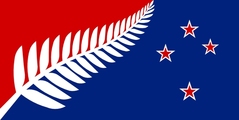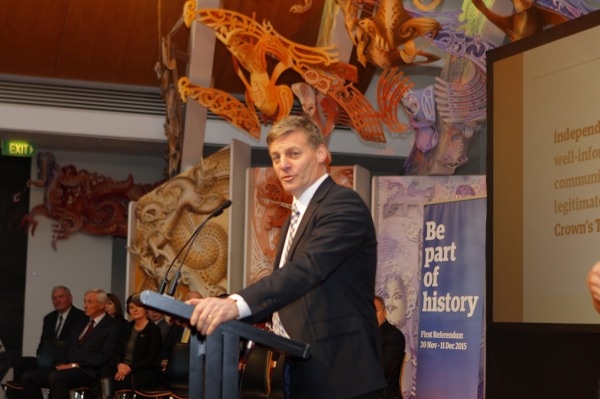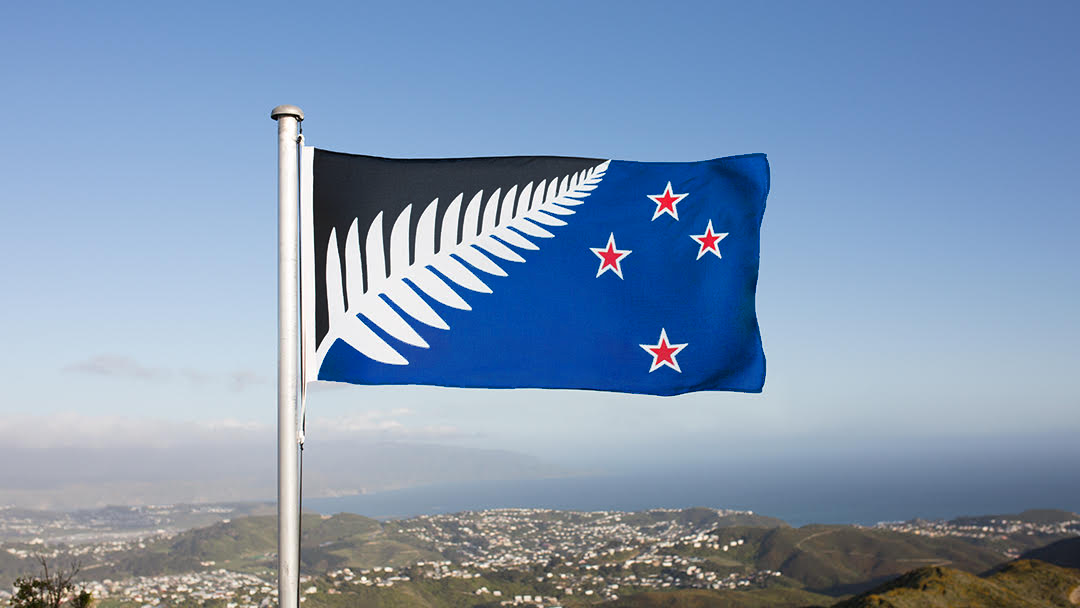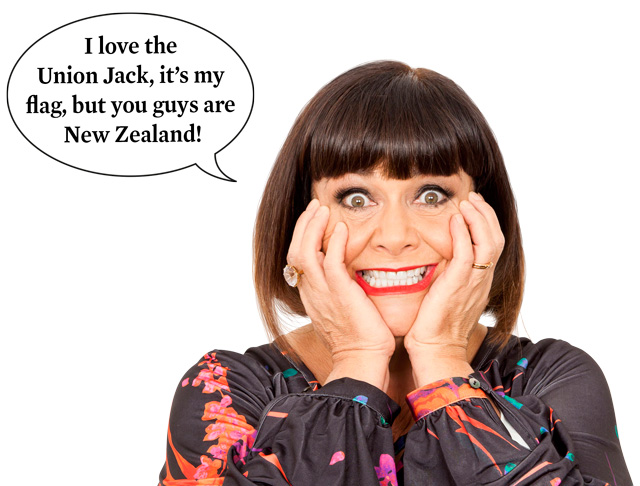|
Prime Minister Bill English has revealed he voted for the flag change, but says John Key's failed referendum on this issue showed the perils of politicians rather than people trying to drive change. It is the first time English has revealed how he voted in the flag referendums. He had refused to give his view at the time because he was in charge of the referendum process. Now he is Prime Minister, English said the flag referendum showed constitutional changes such as the flag or a move toward a republic should not be led by politicians. "That is the lesson from the flag referendum. I oversaw the process for changing the flag, I voted for changing the flag. In the end, a lot of the voting became a bit of a political vehicle, probably because it was proposed by the Prime Minister. "So I think in future that constitutional change needs to come from the will of the people." He said that would apply to any move to become a republic as well.
English was speaking to the Herald in London, where he also discussed his views on republicanism. English said he did not New Zealand to become a republic even after the reign of Queen Elizabeth. That is the time when many believe the issue will be debated in countries such as New Zealand and Australia. He believed that "people would generally support the monarchy and its continuation." Although English missed out on meeting the Queen on this trip because of her recent illness, he said he had met her in the past and hoped to do so again in his role of Prime Minister. She had also sent a Christmas card to him after he became PM. He said the monarchy was a "practical arrangement" that had worked for New Zealand and there was high respect for the Queen. He also believed the upheavals of the Brexit vote would be good for the monarchy. "I think it does [help]. Part of the strength of it has been it is a point of stability in changing times and that is particularly obvious now." He said he was a monarchist. "I support the monarchy. I've looked at the arguments for a republic, but I think in the long run it's important that important constitutional change comes from the people - so bottom up rather than top down. English has previously said he was a monarchist - although he has joked that it would be difficult to be as enthusiastic about it as Key was. Key had visited Balmoral and had several meetings with the Queen, including once promising to advocate for her in the Commonwealth for changes to the rules of succession to allow daughters to be treated the same as male heirs. Claire Trevett, NZ Herald http://m.nzherald.co.nz/nz/news/article.cfm?c_id=1&objectid=11782748
0 Comments
Support for a new flag hasn’t been snuffed out. Rather, its momentum has been temporarily slowed. Dawn French. NEW ZEALAND LISTENER - EDITORIAL
So. After two referendums and a national debate that was far more bruising and acrimonious than anyone expected, we remain where we started: with a national flag that many New Zealanders still have trouble distinguishing from Australia’s, and which identifies us as a quaint British outpost in the South Pacific. The people have spoken – and as former Labour Party leader Mike Moore was fond of saying, the people are always right, even when they are wrong. What, if anything, has been achieved? Critics say it was a scandalous waste of $26 million. But put that figure in perspective: it equates to 0.03% of total Government spending in the past financial year. Put another way, the flag referendum process cost $6 for every New Zealander – far less than the price of a movie ticket. Even weaker was the argument that the referendum process ran roughshod over democracy. The process was fair, thorough and transparent. It was agreed in advance by a parliamentary committee consisting of MPs from every party except New Zealand First, which declined to participate. Two referendums were conducted, public meetings were held up and down the country, more than 10,000 flag designs were submitted for consideration and an advertising campaign reached into virtually every home. In the end, more than two million people – 67% of those eligible – voted, and the Government undertook in advance to honour the result. Not democratic? Really? If anything, New Zealand has enhanced its standing as one of the world’s most democratic states. No other country has chosen its flag by popular vote. If there was a failing, it was of democracy itself when the first referendum, due to the quirks of the preferential system, produced a “favourite” flag design that wasn’t the most popular No 1 choice. But no one ever said democracy was perfect. Other stumbles along the way were caused by flaws of judgment rather than process. One valid criticism was that the shortlist of four designs (increased to five at the last minute to satisfy a noisy social media campaign for the red peak design, which voters resoundingly rejected) failed to represent the breadth and variety of the “long list” of 40. But claims that the shortlist represented the personal favourites of the Prime Minister – which in turn necessitated the belief that the 12 prominent New Zealanders on the Flag Consideration Panel were all under the mind control of John Key – belonged in the realms of fantasy, if not outright paranoia. Another canard was that it was all Key’s idea anyway: a personal vanity project. This no doubt explained the Labour Party’s petulant stance, which itself raises the issue of how far we can trust a party that promoted a change of flag in its 2014 election policy and was fully represented on the cross-party committee that gave its blessing to the referendum process, but changed its mind. Changing the flag wasn’t Key’s idea; it has a history that dates back to the 1960s. Support for change has surfaced repeatedly since, including from such beloved leaders as Norman Kirk and David Lange. Yet another argument ran that rather than dither over the flag, New Zealand should go all the way and become a republic. That way, a new flag would follow automatically. But republicanism remains a fringe movement, and most New Zealanders have no difficulty treating the flag as a distinct issue. Even visiting celebrities such as Dawn French understand that changing the flag is a separate matter. French told Fairfax Media she preferred the fern flag, saying, “Of course I love the Union Jack, it’s my flag … but you guys are New Zealand.” In the end, the margin was closer than anyone predicted: 56.6% of voters favoured the status quo and 43.2% backed the Kyle Lockwood-designed alternative. The referendum may have resulted in no change, but for reasons so complex, confused and contradictory that it would be unwise to draw too many conclusions about why people voted the way they did. There were many ironies, including anti-TPPA protesters voting for the ultimate symbol of corporate greed sanctioned by the Empire. Support for a new flag hasn’t been snuffed out. Rather, its momentum has been temporarily slowed. As we go on with the task of explaining to the rest of the world the difference between our flag and that of Australia – the Aussie flag depicts the Southern Cross more accurately – New Zealanders have at least engaged in a passionate, if frustratingly inconclusive, debate about what our flag should say about us. In the process, we may have learnt something about ourselves. That should leave us better prepared when the issue comes up again – as it will. NEW ZEALAND LISTENER Issue 3959 1st April, 2016 Editorial http://www.listener.co.nz/commentary/features/flag-referendum-win-democracy/  We've written to the Prime Minister and the Leader of the Opposition as they would both like to see a silver fern appear on New Zealand's national flag. Our letter to the prime minister can be viewed below. We'll keep you posted as to his response.
|
MEDIAArchives
December 2022
Categories
All
|
||||||





 RSS Feed
RSS Feed
